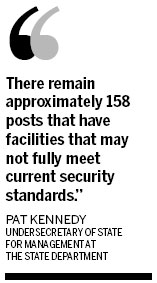Half of US missions may not meet security rules
Updated: 2013-02-16 09:13
(China Daily/Agencies)
|
|||||||||||
$10b allocated to facilities since 1999, 37 projects in design, or being built
More than half the US diplomatic posts overseas may not fully meet security standards, a senior US official told a hearing on Thursday.
The hearing follows an attack on the nation's mission in Benghazi in September last year in which the US ambassador and three other US citizens died.
|
 |
Pat Kennedy, the undersecretary of state for management at the State Department, told a House of Representatives appropriations subcommittee the United States had a diplomatic presence in 283 locations around the world.
He said 97 safe and secure facilities had been completed since the 1999 passage of a US law authorizing additional funding for security upgrades, including 70 full replacements of embassies or consulates, as well as some building of Marine guard quarters and office annexes.
"There remain approximately 158 posts that have facilities that may not fully meet current security standards," he said.
Kennedy was giving written testimony at a closed hearing of the subcommittee that oversees the State Department, but his comments were posted afterwards on a House website.
The issue of embassy security has been under particular scrutiny since the Sept 11, 2012 Benghazi attack. In December, an independent review described security precautions at the US mission in the eastern Libyan city as "grossly inadequate to deal with the attack that took place" there.
Another State Department official said a variety of factors, including increased costs of fuel and construction, contributed to the delay in upgrading security for diplomatic posts.
One of the lawmakers who attended the hearing said part of the problem is that many posts are located directly on streets. This makes them more vulnerable to car bombs and other attacks.
"So ideally, you'd want to find new land to move them. So they are looking at all kinds of different methods," Nita Lowey, the panel's ranking Democrat, told Reuters.
The 1999 law on embassy security construction was passed after the deadly bombings of the US embassies in Kenya and Tanzania a year earlier in which hundreds of people were killed.
In addition to providing funding for security upgrades, the 1999 law contained some new security requirements, including a mandate that any new embassy or consulate building be no less than 30 meters from the compound's perimeter.
Kennedy said Congress has appropriated about $10 billion for the embassy security construction effort since 1999, and that 37 projects are in design or construction.
Following the Benghazi attack, the State Department asked in December for more than $1 billion to be reprogrammed in the current fiscal year to improve security at diplomatic missions.
The Senate has approved the transfer of $1.1 billion in funds that are no longer needed in Iraq because of reduced operations there.
The House has yet to decide whether to make the reprogramming move, although Kay Granger, who chairs the House appropriations subcommittee, said she looked favorably on the idea.
"There is great concern, as you can imagine, about what needs to be done," said Granger, a Republican.
Reuters
Related Stories
US diplomat meets UN-AL envoy on Syria 2012-12-05 10:32
US diplomat heads to Tokyo, Seoul 2012-10-25 01:20
US diplomat asks Japan, ROK to resolve islands spat 2012-10-17 01:30
UN condemns killing of US diplomats in Libya 2012-09-13 05:03
China condemns US diplomatic compound attack 2012-09-13 02:15
Today's Top News
Police continue manhunt for 2nd bombing suspect
H7N9 flu transmission studied
8% growth predicted for Q2
Nuke reactor gets foreign contract
First couple on Time's list of most influential
'Green' awareness levels drop in Beijing
Palace Museum spruces up
Trading channels 'need to broaden'
Hot Topics
Lunar probe , China growth forecasts, Emission rules get tougher, China seen through 'colored lens', International board,
Editor's Picks

|

|

|

|

|

|





